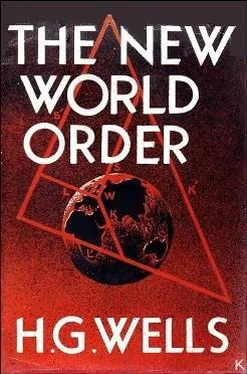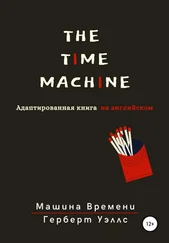Герберт Уэллс - The New World Order
Здесь есть возможность читать онлайн «Герберт Уэллс - The New World Order» весь текст электронной книги совершенно бесплатно (целиком полную версию без сокращений). В некоторых случаях можно слушать аудио, скачать через торрент в формате fb2 и присутствует краткое содержание. Год выпуска: 1940, Жанр: Политика, Публицистика, на английском языке. Описание произведения, (предисловие) а так же отзывы посетителей доступны на портале библиотеки ЛибКат.
- Название:The New World Order
- Автор:
- Жанр:
- Год:1940
- ISBN:нет данных
- Рейтинг книги:4 / 5. Голосов: 1
-
Избранное:Добавить в избранное
- Отзывы:
-
Ваша оценка:
- 80
- 1
- 2
- 3
- 4
- 5
The New World Order: краткое содержание, описание и аннотация
Предлагаем к чтению аннотацию, описание, краткое содержание или предисловие (зависит от того, что написал сам автор книги «The New World Order»). Если вы не нашли необходимую информацию о книге — напишите в комментариях, мы постараемся отыскать её.
The New World Order — читать онлайн бесплатно полную книгу (весь текст) целиком
Ниже представлен текст книги, разбитый по страницам. Система сохранения места последней прочитанной страницы, позволяет с удобством читать онлайн бесплатно книгу «The New World Order», без необходимости каждый раз заново искать на чём Вы остановились. Поставьте закладку, и сможете в любой момент перейти на страницу, на которой закончили чтение.
Интервал:
Закладка:
There never has been anything on earth that could be properly called a Capitalist SYSTEM. What was the matter with his world was manifestly its entire want of system. What the Socialists were feeling their way towards was the discovery and establishment of a world system.
The Haves of our period were and are a fantastic miscellany of people, inheriting or getting their power and influence by the most various means and methods. They had and have nothing of the interbreeding social solidarity even of a feudal aristocracy or an Indian caste. But Marx, looking rather into his inner consciousness than at any concrete reality, evolved that monster "System" on his Right. Then over against it, still gazing steadily into that vacuum, he discovered on the Left the proletarians being steadily expropriated and becoming class-conscious. They were just as endlessly various in reality as the people at the top of the scramble; in reality but not in the mind of the Communist seer. There they consolidated rapidly.
So while other men toiled at this gigantic problem of collectivisation, Marx found his almost childishly simple recipe. All you had to do was to tell the workers that they were being robbed and enslaved by this wicked "Capitalist System" devised by the "bourgeoisie". They need only "unite"; they had "nothing to lose but their chains". The wicked Capitalist System was to be overthrown, with a certain vindictive liquidation of "capitalists" in general and the "bourgeoisie" in particular, and a millennium would ensue under a purely workers' control, which Lenin later on was to crystallise into a phrase of supra-theological mystery, "the dictatorship of the proletariat". The proletarians need learn nothing, plan nothing; they were right and good by nature; they would just "take over". The infinitely various envies, hatreds and resentments of the Have-nots were to fuse into a mighty creative drive. All virtue resided in them; all evil in those who had bettered them. One good thing there was in this new doctrine of the class war, it inculcated a much needed brotherliness among the workers, but it was balanced by the organisation of class hate. So the great propaganda of the class war, with these monstrous falsifications of manifest fact, went forth. Collectivisation would not so much be organised as appear magically when the incubus of Capitalism and all those irritatingly well-to-do people, were lifted off the great Proletarian soul.
Marx was a man incapable in money matters and much bothered by tradesmen's bills. Moreover he cherished absurd pretensions to aristocracy. The consequence was that he romanced about the lovely life of the Middle Ages as if he were another Belloc and concentrated his animus about the "bourgeoisie", whom he made responsible for all those great disruptive forces in human society that we have considered. Lord Bacon, the Marquis of Worcester, Charles the Second and the Royal Society, people like Cavendish and Joule and Watt for example, all became "bourgeoisie" in his inflamed imagination. "During its reign of scarce a century", he wrote in the Communist Manifesto, "the bourgeoisie has created more powerful, more stupendous forces of production than all preceding generations rolled into one. What earlier generations had the remotest inkling that such productive forces slumbered within the wombs of associated labour?"
"The wombs of associated labour!" (Golly, what a phrase!) The industrial revolution which was a consequence of the mechanical revolution is treated as the cause of it. Could facts be muddled more completely?
And again: ". the bourgeois system is no longer able to cope with the abundance of wealth it creates. How does the bourgeoisie overcome these crises? On the one hand, by the compulsory annihilation of a quantity of the productive forces; on the other, by the conquest of new markets and the more thorough exploitation of old ones. With what results? The results are that the way is paved for more widespread and more disastrous crises and that the capacity for averting such crises is lessened.
"The weapons" (WEAPONS! How that sedentary gentleman in his vast beard adored military images!) "with which the bourgeoisie overthrew feudalism are now being turned against the bourgeoisie itself.
"But the bourgeoisie has not only forged the weapons that will slay it; it has also engendered the men who will use these weapons-the modern workers, the proletarians."
And so here they are, hammer and sickle in hand, chest stuck out, proud, magnificent, commanding, in the Manifesto. But go and look for them yourself in the streets. Go and look at them in Russia.
Even for 1848 this is not intelligent social analysis. It is the outpouring of a man with a B in his bonnet, the hated Bourgeoisie, a man with a certain vision, uncritical of his own sub-conscious prejudices, but shrewd enough to realise how great a driving force is hate and the inferiority complex. Shrewd enough to use hate and bitter enough to hate. Let anyone read over that Communist Manifesto and consider who might have shared the hate or even have got it all, if Marx had not been the son of a rabbi. Read Jews for Bourgeoisie and the Manifesto is pure Nazi teaching of the 1933-8 vintage.
Stripped down to its core in this fashion, the primary falsity of the Marxist assumption is evident. But it is one of the queer common weaknesses of the human mind to be uncritical of primary assumptions and to smother up any enquiry into their soundness in secondary elaboration, in technicalities and conventional formul [1] See Hogben's Dangerous Thoughts.
. Most of our systems of belief rest upon rotten foundations, and generally these foundations are made sacred to preserve them from attack. They become dogmas in a sort of holy of holies. It is shockingly uncivil to say "But that is nonsense". The defenders of all the dogmatic religions fly into rage and indignation when one touches on the absurdity of their foundations. Especially if one laughs. That is blasphemy.
This avoidance of fundamental criticism is one of the greatest dangers to any general human understanding. Marxism is no exception to the universal tendency. The Capitalist System has to be a real system, the Bourgeoisie an organised conspiracy against the Workers, and every human conflict everywhere has to be an aspect of the Class War, or they cannot talk to you. They will not listen to you. Never once has there been an attempt to answer the plain things I have been saying about them for a third of a century. Anything not in their language flows off their minds like water off a duck's back. Even Lenin-by far the subtlest mind in the Communist story-has not escaped this pitfall, and when I talked to him in Moscow in 1920 he seemed quite unable to realise that the violent conflict going on in Ireland between the Catholic nationalists and the Protestant garrison was not his sacred insurrection of the Proletariat in full blast.
To-day there is quite a number of writers, and among them there are men of science who ought to think better, solemnly elaborating a pseudo-philosophy of science and society upon the deeply buried but entirely nonsensical foundations laid by Marx. Month by month the industrious Left Book Club pours a new volume over the minds of its devotees to sustain their mental habits and pickle them against the septic influence of unorthodox literature. A Party Index of Forbidden Books will no doubt follow. Distinguished professors with a solemn delight in their own remarkable ingenuity, lecture and discourse and even produce serious-looking volumes, upon the superiority of Marxist physics and Marxist research, to the unbranded activities of the human mind. One tries not to be rude to them, but it is hard to believe they are not deliberately playing the fool with their brains. Or have they a feeling that revolutionary communism is ahead, and are they doing their best to rationalise it with an eye to those red days to come?*
Читать дальшеИнтервал:
Закладка:
Похожие книги на «The New World Order»
Представляем Вашему вниманию похожие книги на «The New World Order» списком для выбора. Мы отобрали схожую по названию и смыслу литературу в надежде предоставить читателям больше вариантов отыскать новые, интересные, ещё непрочитанные произведения.
Обсуждение, отзывы о книге «The New World Order» и просто собственные мнения читателей. Оставьте ваши комментарии, напишите, что Вы думаете о произведении, его смысле или главных героях. Укажите что конкретно понравилось, а что нет, и почему Вы так считаете.

![Герберт Уэллс - The War of the Worlds [С англо-русским словарем]](/books/26611/gerbert-uells-the-war-of-the-worlds-s-anglo-thumb.webp)










